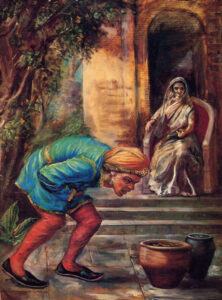The Expelled Prince
Once, a king expelled his son from his kingdom in a moment of rage. The spoiled son, having no skills or vocation, found himself helpless. He had learned a little singing and dancing as a hobby during his childhood, so he took to performing on the streets of a town in a hot and arid neighboring country where he found refuge.
For ten years, the king’s son lived the life of a homeless beggar in tattered and dirty clothes, completely forgetting that he was ever a prince. Curiously enough, during these ten years, he matured towards kingship, as he was the only son of the aging king. Yet, at present, he was a faceless person moving from door to door with a begging bowl in his hands.
The Search for the Prince
As the king grew very old, he became worried about the future of his throne. He asked his prime minister to search for his only son and bring him back to take over the kingdom. The prime minister went out in search of the prince. After much inquiry and effort, he reached the town where the future king was living as a nobody.
The prime minister’s chariot halted in front of a hotel, where he found the young man begging for money to buy himself a pair of sandals. He recognized him instantly despite his ragged appearance.
The Return to Royalty
The prime minister bowed to him and said, “The king has pardoned you and asks you to return to your kingdom.” In a split second, the young man’s face transformed, and he threw away his beggar’s bowl. He ceased to be a beggar and reclaimed his identity as a king.
He instructed the prime minister, “Go to the market and bring me a pair of good shoes and clothes, and in the meantime, make arrangements for my bath.” With the stride of a prince, he walked to the chariot and stepped aboard.
The Reaction of the Crowd
Everyone who had given him alms or denied them earlier gathered around the chariot. They noticed he was a different man altogether and not even looking at them now. They asked him, “How is it you forget us in a moment?”
The prince replied, “I remembered you as long as I had forgotten who I was. Just now I have remembered who I am, so forget that I am a beggar.”
When reminded of his recent past, he said, “Now I remember. Now I know I am a king. I have always been a king.”
Moral of the Story
Krishna’s way is just to remind man of who he truly is. This is not something to practice but merely a remembering. Within a moment of this remembrance, everything is transformed; the beggar’s bowl is thrown away. In one moment, one ceases to be a beggar and becomes a king.
The Teachings of the Bhagavad Gita
Throughout the GEETA, Krishna does nothing but remind Arjuna of who he is. He does not give a sermon but repeatedly jolts Arjuna to remember his true self. Krishna is not there to teach, but to awaken Arjuna, shaking him to wake up and recognize his innate nature.
He tells Arjuna, “You are engrossed in very petty matters like people will die at your hands if you fight. Wake up and see for yourself if anyone has ever been dead. You are eternally alive.”
But Arjuna, dreaming and asleep, asks why he should kill his own kinsmen. Krishna does not explain but provides shock treatment to wake Arjuna up to see the reality for himself.
Reflection
Krishna’s message is clear: we must remember our true nature. This awakening transforms our perception and actions. Like the prince who reclaimed his kingship, we too can reclaim our divine nature when we remember who we truly are.



